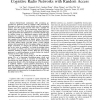54 search results - page 9 / 11 » On the Complexity of Nash Equilibria of Action-Graph Games |
INFOCOM
2011
IEEE
12 years 10 months ago
2011
IEEE
Abstract—Market-based mechanisms offer promising approaches for spectrum access in cognitive radio networks. In this paper, we focus on two market models, one with a monopoly pri...
CORR
2010
Springer
13 years 6 months ago
2010
Springer
We propose a new class of game-theoretic models for network formation in which strategies are not directly related to edge choices, but instead correspond more generally to the ex...
SIGECOM
2006
ACM
14 years 20 days ago
2006
ACM
In traditional game theory, players are typically endowed with exogenously given knowledge of the structure of the game—either full omniscient knowledge or partial but fixed in...
GAMESEC
2011
12 years 6 months ago
2011
Recent smartphones incorporate embedded GPS devices that enable users to obtain geographic information about their surroundings by providing a location-based service (LBS) with the...
ECAI
2006
Springer
13 years 10 months ago
2006
Springer
Abstract. Game theory is a widely used formal model for studying strategical interactions between agents. Boolean games [8] are two players, zero-sum static games where players...



